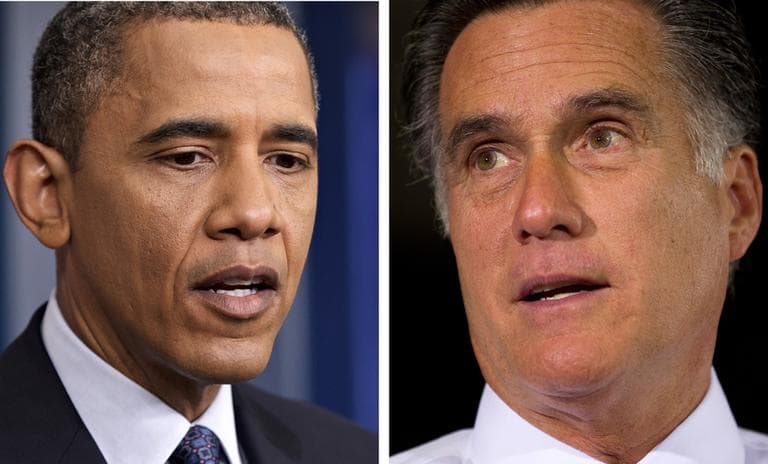Advertisement
The Political Prez Puzzle: How Will X Factors Tilt The Election?

With four months to go, the presidential race continues to be too close to call. And we can’t possibly foresee the outcome until we know the answers to questions like these:
1) Will Mitt Romney have a strategy to increase his support among Hispanic voters?
According to polls, President Obama has a huge lead with Hispanics. If Romney continues to be seen as “severely conservative” on illegal immigration and can’t offset that with a targeted appeal to Hispanics on economic issues, he will likely lose. The demographics in swing states reveal why the Hispanic vote is crucial. The latest U.S. Census reports that in New Mexico, 46 percent of the population is Latino. In Florida, 23 percent. Colorado, 21 percent. Nevada, 27 percent.
2) Can Romney improve his appeal to women?
According to polls, Romney is doing relatively well with married women, but lags far behind Obama with single women. Will he try TV spots like those currently running for Scott Brown, showing him as a sensitive, supportive family man? Or will he make the case that his ability to improve the economy will particularly benefit women?
3) Who will “win” the debates?
In a close contest, the debates will be decisive... or not. If each candidate has a fairly solid base of 45 to 48 percent, and issues continue to polarize the electorate evenly, perhaps the debates will be a draw. It’s not easy to “win” a debate, but sometimes a candidate will lose a debate by making a gaffe. (For example, having an “oops” moment like Texas Gov. Rick Perry did in a GOP primary debate.)
Obama is more eloquent and personable than Romney. However, Romney benefits as a challenger from lower expectations. “Beating expectations” is often the measure of success. It’s possible, as in past presidential debates, that one candidate will be thought to win one debate, while losing another, and perhaps tying a third.
4) How will Romney counter Obama ads attacking him for outsourcing jobs?
Recent polls in swing states indicate that Obama attack ads are having an effect. The TV spots charge that Romney’s record at Bain Capital had him profiting from bankrupting companies. Being portrayed as a "vulture capitalist" is not a flattering image. Romney explains that his record is one of creating more jobs than he eliminated. But his negative ratings have gone up; voters see him as less likable than Obama. How can Romney's “Mad Men” make him more appealing? Or do swing voters want an efficient management type who will down-size the federal bureaucracy and stimulate private investment?
5) Will Obamacare be a persuasive issue to swing voters?
The Supreme Court ruling on Obamacare revived it as a catalytic issue for debate. Both parties are using the issue for fundraising and to mobilize their base supporters. But are undecided swing voters as interested — or do they think of it as “same old” news about a seemingly endless debate?
6) Will young voters turn out?
In 2008, under-30 voters were enthusiastic about Obama and voted in record numbers. Since then their enthusiasm has waned. Can the Obama campaign, using social media and the advantages of incumbency, mobilize them again?
7) Will Romney’s running mate help, hinder, or have virtually no effect?
Analysts are guessing that his VP choice has narrowed to just a few prospects: former Minnesota Gov. Tim Pawlenty, Ohio Sen. Rob Portman, Louisiana Gov. Bobby Jindal, Wisconsin Congressman Paul Ryan. Will he go bold (Ryan, Jindal) or safe (Pawlenty, Portman)?
8) How will different economic conditions affect certain swing states?
Nationally, the economy is a drag on Obama’s popularity, but in swing states it is not so simple. ABC News explains:
The good news for Obama is that five key swing states have unemployment rates that are below the national average, which is 8.2 percent as of last week. New Hampshire is at 5 percent; Iowa is at 5.1 percent; Virginia is at 5.6; Ohio is 7.4; and Colorado, 7.9. Three swing states, however, have unemployment rates higher than the national average: Florida, with 8.7 percent; North Carolina, with 9.4 percent; and Nevada, with 11.7 percent, the highest in the country.
9) Will the “flip-flopper” charge return to haunt Romney?
In 2008, Romney lost the GOP nomination because he was seen as inauthentic and lacking core convictions. In the 2012 GOP primaries, he was again criticized as a flip-flopper but managed to prevail — often due to the foibles of his opponents, rather than his having an improved reputation.
Since securing the GOP nomination, Romney seems to have minimized the flip-flopper image by staying consistent... and vague. Will he avoid making a gaffe or “Etch A Sketch” change of positions that would revive the perception of flip-floppery?
10) Will there be a surge in superPAC money at the end?
Independent expenditure groups are spending unprecedented sums on advertising. But imagine if some billionaires decide to contribute an extra $100 billion in a few swing states. That kind of money in relatively small states like Virginia, North Carolina, New Hampshire, and Iowa could make a huge difference.
11) Will new controversies emerge about religion, race, family or business?
It’s doubtful that either campaign will overtly attack the opposition on personal issues that could backfire. But with the multiplicity of media — including blogs, viral videos, and third-party ads — it’s not difficult to imagine that there will be some disturbing, personal charges and counter-charges in the final months.
12) Will late economic news shape the debate?
The jobs reports for the last three months indicate that the economy has been moving backward. If this trend continues, it will be hard for Obama to convincingly claim that his policies have worked. However, if the economic data improve in the remaining months, Romney will have a more difficult time in arguing that Obama represents absolute failure.
Eyes often glaze over when economic statistics are cited, but there are a few headline numbers that have an effect on news coverage and conversation: the unemployment rate, new jobs created, and GDP growth. Since the economy is the dominant issue in this campaign, the economic news in the final months could well be the most influential X factor of all.
This program aired on July 6, 2012. The audio for this program is not available.
